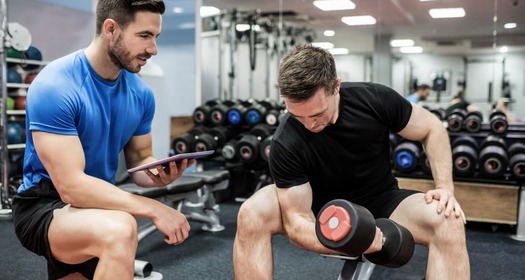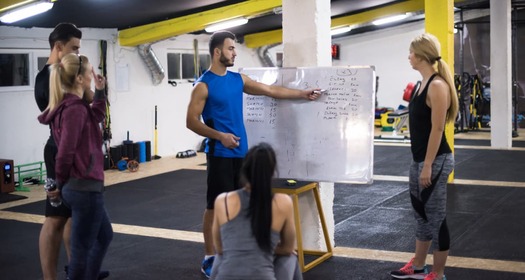In today's increasingly competitive sports landscape, strength and conditioning coaches play a vital role in helping athletes and teams achieve peak performance. As a strength and conditioning coach, you have the opportunity to work with professional and elite athletes, sports teams, and sports clubs, enabling them to reach their full potential and excel in their chosen sports. This prestigious role offers a unique opportunity to make a significant impact on the careers of talented athletes and the success of top sports organisations. Additionally, personal trainers can also benefit from strength and conditioning qualifications to enhance their novice clients' training experiences.
What Does a Strength and Conditioning Coach Do?
Strength and conditioning coaches are responsible for designing and implementing training programmes that focus on improving an athlete's physical performance, including strength, power, speed, agility, and endurance. On a day-to-day basis, a strength and conditioning coach might:
- Conduct assessments and evaluations to identify an athlete's strengths and weaknesses
- Design bespoke training programmes tailored to an athlete's specific needs and goals
- Monitor and track an athlete's progress and adjust training plans accordingly
- Teach and demonstrate proper exercise technique and form
- Implement injury prevention strategies and collaborate with other healthcare professionals to manage injuries and rehabilitation
- Educate athletes on nutrition, recovery, and other aspects of sports performance
- Communicate with athletes, coaches, and other support staff to ensure a coordinated approach to an athlete's development
Working as a strength and conditioning coach allows you to contribute to the success of professional and elite athletes, and to be part of the wider team supporting their athletic endeavours. Strength and conditioning qualifications can also be valuable for personal trainers who want to enhance their skillset and help their novice clients achieve better results.
How to Become a Strength and Conditioning Coach
To become a strength and conditioning coach, you'll need to obtain relevant qualifications that are endorsed by REPs. While some fitness professionals choose to start their careers as personal trainers and then specialise in strength and conditioning, others may decide to pursue this field directly.
There are various routes to gaining the necessary qualifications to work as a strength and conditioning coach. Some individuals may choose to complete a degree in sports science, exercise science, or a related field, while others may opt for vocational qualifications endorsed by REPs, such as a Level 4 Strength and Conditioning qualification.
When selecting a training provider, it's crucial to ensure that the course you choose is endorsed by REPs. This guarantees that the course meets the required industry standards and will provide you with the necessary knowledge and skills to excel in your role. To find a suitable course, visit the find a course page.
Professional Bodies and Associations
Once you have obtained the necessary qualifications, it's essential to join a professional body or association, such as the Register of Exercise Professionals (REPs). Being a member of a professional organisation demonstrates your commitment to maintaining high standards of practice and ongoing professional development. In addition, membership provides you with access to valuable resources, networking opportunities, and support throughout your career.
Continuing Professional Development
As a strength and conditioning coach, it's crucial to stay up-to-date with the latest research, techniques, and best practices in the field. Continuing professional development (CPD) plays a significant role in ensuring that you remain at the forefront of industry advancements and maintain a high level of competence throughout your career.
REPs endorse a variety of CPD courses and workshops, which can help you broaden your knowledge and skills in specific areas related to strength and conditioning. By engaging in regular CPD activities, you can stay informed about the latest trends and innovations in the industry, enhance your professional reputation, and ultimately, provide the best possible service to your clients and athletes.
Career Opportunities and Progression
As a strength and conditioning coach, there are numerous career opportunities and pathways available to you. These include:
- Working with professional and elite athletes or sports teams
- Employment within a sports club or organisation
- Opening your own strength and conditioning facility or gym
- Consulting with sports organisations or governing bodies
- Teaching and lecturing within the field of sports science and strength and conditioning
- Conducting research or writing for industry publications
Moreover, with the right qualifications and experience, you may progress to roles such as a head strength and conditioning coach or performance director, overseeing the physical development and performance of athletes across multiple sports and disciplines.
For personal trainers, gaining a strength and conditioning qualification can help expand your client base and enable you to offer specialised services to a broader range of clients, including those with specific performance goals or those participating in competitive sports.
Conclusion
A career as a strength and conditioning coach offers numerous opportunities to work with professional and elite athletes, sports teams, and organisations, as well as the chance to make a significant impact on their performance and success. With the right qualifications and commitment to ongoing professional development, you can build a rewarding and fulfilling career in this exciting field.
To explore suitable strength and conditioning qualifications endorsed by REPs, visit the find a course page and begin your journey towards a successful career in strength and conditioning.







Leave Comment Below